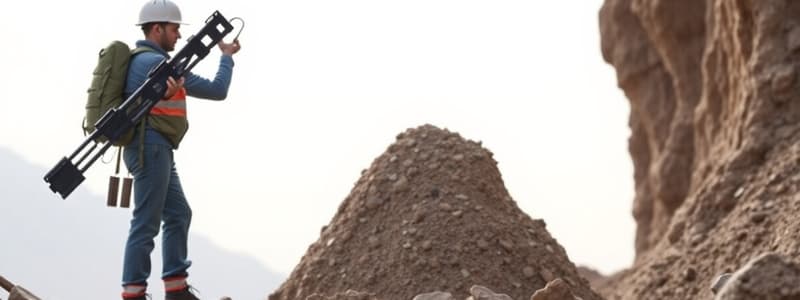Podcast
Questions and Answers
How is the depletion rate per unit calculated?
How is the depletion rate per unit calculated?
- By subtracting the total production costs from the total output.
- By dividing the depletable amount of the wasting asset by the units estimated to be extracted. (correct)
- By adding the total extracted units to the remaining asset value.
- By multiplying the total output by the useful life of the asset.
When is the straight-line method of depreciation used for mining equipment?
When is the straight-line method of depreciation used for mining equipment?
- When the equipment is movable and can be used for future projects. (correct)
- When the useful life of the equipment is shorter than that of the wasting asset.
- When the useful life of the wasting asset is shorter than that of the equipment.
- When the useful life of the wasting asset is longer than that of the equipment.
What does the Trust Fund Doctrine state regarding share capital?
What does the Trust Fund Doctrine state regarding share capital?
- Share capital serves only to pay dividends to shareholders.
- Share capital must be used exclusively for operational costs.
- Share capital can be returned to shareholders at any time.
- Share capital is a trust fund intended to protect creditors and cannot be returned during the corporation's lifetime. (correct)
What distinguishes the Waste Asset Doctrine from the Trust Fund Doctrine?
What distinguishes the Waste Asset Doctrine from the Trust Fund Doctrine?
Under what condition can a corporation pay dividends, according to the Trust Fund Doctrine?
Under what condition can a corporation pay dividends, according to the Trust Fund Doctrine?
What does the term 'exploration and evaluation of mineral resources' primarily involve?
What does the term 'exploration and evaluation of mineral resources' primarily involve?
Which of the following activities is considered an example of exploration and evaluation expenditure?
Which of the following activities is considered an example of exploration and evaluation expenditure?
How must an entity treat exploration and evaluation expenditures according to IFRS 6?
How must an entity treat exploration and evaluation expenditures according to IFRS 6?
What is a wasting asset?
What is a wasting asset?
Which of the following is NOT considered a topographical or geological study in exploration?
Which of the following is NOT considered a topographical or geological study in exploration?
What is implied about accounting policies for exploration and evaluation assets under IFRS 6?
What is implied about accounting policies for exploration and evaluation assets under IFRS 6?
Which of the following contributes to evaluating the commercial viability of extracting a mineral resource?
Which of the following contributes to evaluating the commercial viability of extracting a mineral resource?
Which activity is NOT directly related to exploration and evaluation of mineral resources?
Which activity is NOT directly related to exploration and evaluation of mineral resources?
What characterizes wasting assets?
What characterizes wasting assets?
Which of the following is NOT a category of cost associated with wasting assets?
Which of the following is NOT a category of cost associated with wasting assets?
What does the acquisition cost of a wasting asset refer to?
What does the acquisition cost of a wasting asset refer to?
Which of the following describes exploration costs?
Which of the following describes exploration costs?
Which method capitalizes costs related to dry holes or unsuccessful discoveries?
Which method capitalizes costs related to dry holes or unsuccessful discoveries?
What should be deducted from the total acquisition cost to determine the depletable amount?
What should be deducted from the total acquisition cost to determine the depletable amount?
Successful effort accounting treats which costs as capitalized?
Successful effort accounting treats which costs as capitalized?
Which cost category includes activities like geological studies and exploratory drilling?
Which cost category includes activities like geological studies and exploratory drilling?
Which of the following best describes development costs for a natural resource?
Which of the following best describes development costs for a natural resource?
What is the primary difference between tangible equipment and intangible development costs?
What is the primary difference between tangible equipment and intangible development costs?
Estimated restoration costs must be capitalized under what condition?
Estimated restoration costs must be capitalized under what condition?
What does depletion refer to in the context of natural resources?
What does depletion refer to in the context of natural resources?
Which method is most commonly used to compute depletion?
Which method is most commonly used to compute depletion?
What type of cost does tangible equipment represent?
What type of cost does tangible equipment represent?
When may estimated restoration costs be netted against the expected residual value?
When may estimated restoration costs be netted against the expected residual value?
Which of the following does not constitute a component of development costs?
Which of the following does not constitute a component of development costs?
Flashcards
Depletion Rate Per Unit
Depletion Rate Per Unit
The amount of a wasting asset's value divided by the estimated units to be extracted.
Depletion Calculation
Depletion Calculation
Multiply the depletion rate per unit by the number of units extracted during a period to determine the depletion expense.
Depreciation of Mining Equipment
Depreciation of Mining Equipment
The depreciation of mining equipment is based on the shorter of its useful life or the useful life of the wasting asset.
Trust Fund Doctrine
Trust Fund Doctrine
Signup and view all the flashcards
Waste Asset Doctrine
Waste Asset Doctrine
Signup and view all the flashcards
Wasting Asset
Wasting Asset
Signup and view all the flashcards
Features of Wasting Assets
Features of Wasting Assets
Signup and view all the flashcards
Acquisition Cost
Acquisition Cost
Signup and view all the flashcards
Residual Land Value
Residual Land Value
Signup and view all the flashcards
Depletable Amount
Depletable Amount
Signup and view all the flashcards
Exploration Cost
Exploration Cost
Signup and view all the flashcards
Successful Effort Method
Successful Effort Method
Signup and view all the flashcards
Full Cost Method
Full Cost Method
Signup and view all the flashcards
Development Cost
Development Cost
Signup and view all the flashcards
Tangible Equipment
Tangible Equipment
Signup and view all the flashcards
Intangible Development Cost
Intangible Development Cost
Signup and view all the flashcards
Estimated Restoration Cost
Estimated Restoration Cost
Signup and view all the flashcards
Depletion
Depletion
Signup and view all the flashcards
Output or Production Method
Output or Production Method
Signup and view all the flashcards
Exploration & Evaluation
Exploration & Evaluation
Signup and view all the flashcards
Exploration & Evaluation Expenditures
Exploration & Evaluation Expenditures
Signup and view all the flashcards
Exploration & Evaluation Asset?
Exploration & Evaluation Asset?
Signup and view all the flashcards
IFRS 6 Treatment of Expenditures
IFRS 6 Treatment of Expenditures
Signup and view all the flashcards
What are some examples of Exploration & Evaluation Expenditures?
What are some examples of Exploration & Evaluation Expenditures?
Signup and view all the flashcards
What does IFRS 6 mean by 'relevant and reliable'?
What does IFRS 6 mean by 'relevant and reliable'?
Signup and view all the flashcards
Why are Wasting Assets so important?
Why are Wasting Assets so important?
Signup and view all the flashcards
Study Notes
Exploration and Evaluation of Mineral Resources
- Exploration and evaluation of mineral resources involves searching for minerals, oil, natural gas, and similar resources after obtaining legal rights to explore a specific area. It also includes assessing the technical feasibility and commercial viability of extracting these resources.
Exploration and Evaluation Expenditures
- Examples include:
- Acquisition of exploration rights
- Topographical, geological, geochemical, and geophysical studies
- Exploratory drilling
- Trenching
- Sampling
- Activities related to evaluating technical and commercial viability
- General and administrative costs directly linked to exploration and evaluation
Treatment of Exploration and Evaluation Expenditures
- Exploration and evaluation expenditures may qualify as an asset, but the standard doesn't offer clear guidelines.
- Companies must create their own accounting policies for recognizing such assets.
- Companies can continue using their existing accounting approach if the resulting information is relevant and reliable.
Wasting Assets Definition
- Wasting assets are physical resources such as coal, oil, ore, gold, and silver, with economic value.
- They're 'wasting' because they are consumed and cannot be replaced immediately by humans, but only by natural processes.
- Key characteristics: Physical consumption and irreplaceability.
Cost of Wasting Assets
- Wasting asset costs include:
- Acquisition cost (price paid for the property containing the natural resources).
- Exploration cost (expenditures before technical and commercial viability is confirmed).
- Development cost (costs to extract the natural resource).
- Estimated restoration cost (cost to restore the property to its original condition.)
Acquisition Cost of Wasting Assets
- Acquisition cost is the initial price of the property that contains the natural resource.
- It's also the cost of the wasting asset.
Exploration Cost of Wasting Assets
- Exploration costs are incurred before confirming technical and commercial extraction viability.
- These costs include exploration rights, geological studies, exploratory drilling, trenching, and sampling.
Successful Effort and Full Cost Methods for Exploration Costs
- Successful Effort: Only capitalize exploration costs directly linked to discovering commercially producible resources. Costs related to unsuccessful discoveries are expensed.
- Full Cost: Capitalize all exploration costs (successful or unsuccessful) as part of the resource's cost. This method assumes that all exploration activity contributes to the discovery of the resource.
Development Cost of Wasting Assets
- Development costs are incurred to extract natural resources located from successful exploration efforts.
- These costs might include tangible equipment (e.g., machinery) and intangible development costs.
Tangible and Intangible Development Costs
- Tangible Equipment: Equipment (e.g., transport equipment, heavy machinery) is depreciated according to standard company policies. It's not directly capitalized as part of the natural resource.
- Intangible Development Costs: Involve mine shafts, construction wells, etc, and are capitalized as part of the natural resources cost
Estimated Restoration Cost
- Estimated restoration cost considers the cost to return a property to its original state.
- This cost is either added to the resource property's cost or offset against its expected residual value.
- Capitalization of this cost is linked with legal/contractual obligation arising from the acquisition.
Depletion Concept
- Depletion refers to removing, extracting, or exhausting natural resources.
- It involves systematically allocating the cost of depletable wasting assets over their extraction period.
Common Depletion Method
- The common or most-used method is the output method, which involves dividing the total depletable amount of wasting assets by the estimated number of units expected to be extracted. This then calculates depletion rate per unit, used to determine depletion for a given period.
Depreciation of Tangible Equipment
- Tangible equipment used in extraction is depreciated, usually based on equipment useful life, or the mineral deposit's useful life, whichever is shorter.
- A straight-line method is usually employed if equipment useful lifespan is shorter.
- If mining equipment is mobile and reusable in future projects the equipment depreciates over its useful lifetime using a straight-line method.
Trust Fund Doctrine
- Share capital of a corporation is often considered a trust fund for creditors.
- Dividends cannot surpass retained earnings.
- Replenishing capital to shareholders requires careful management to adhere to existing financial frameworks.
Waste Asset Doctrine
- Wasting asset corporations can return capital to shareholders during their lifetime.
- Dividend payments can exceed retained earnings to the extent of accumulated depreciation/loss in a corporate entity.
Studying That Suits You
Use AI to generate personalized quizzes and flashcards to suit your learning preferences.




